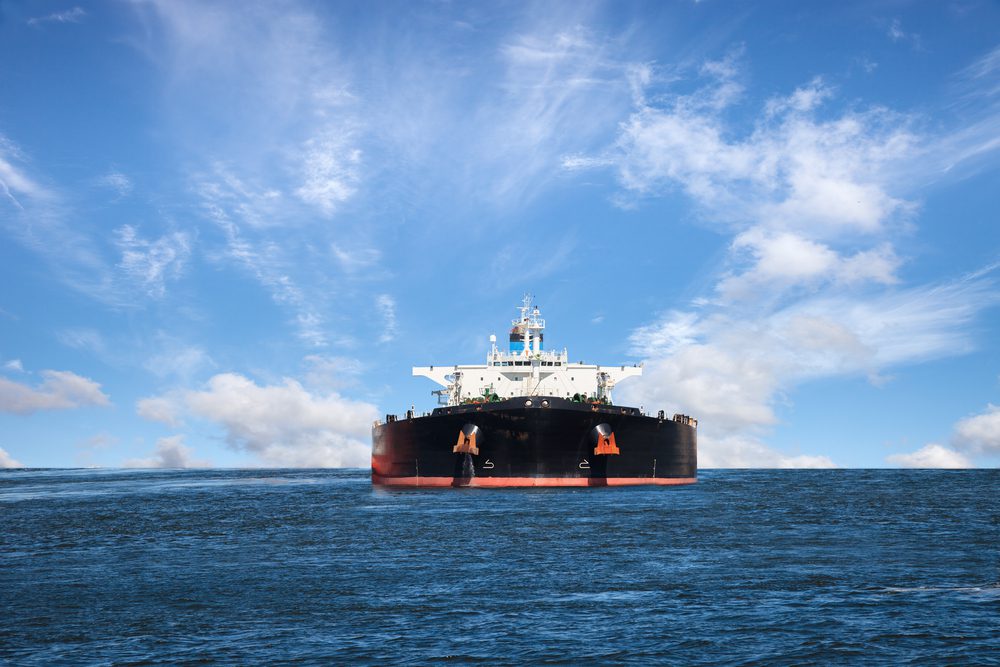By Naomi Christie and Rakteem Katakey
(Bloomberg) — Back when the global recession trashed oil demand and prices, the likes of BP Plc and Vitol Group found a novel way to profit: They stashed crude on tankers. With a slump of similar magnitude now, traders are seldom finding the same opportunities.
Here’s why. What defined both periods is something the industry calls contango, meaning oil for next month is cheaper than, say, for April. There were moments in the depths of the 2008-09 recession when a standard 2 million barrel cargo might fetch $14 million more for later delivery than it did in the spot market. That made for an easy trade: Find a ship for less than that. The same economics have seldom worked this year.
“These are very different market conditions,” said Paul Horsnell, London-based head of commodities research at Standard Chartered Plc. “Traders certainly are not getting much from floating storage plays.”
The main difference now is what people expect for the future of the oil market. The financial crisis was seen as a short, sharp shock to oil demand that wouldn’t endure, according to Eugene Lindell, an analyst at JBC Energy GmbH, a consultant in Vienna. That meant later prices far exceeded immediate ones. Now, the most enduring glut in decades leaves traders believing the market’s recovery could be much slower.
Less Potential
That means the cost of storing would wipe out potential profit from doing so. In mid-November, the three-month contango was about $2.50 a barrel, or about $5 million for one of the industry’s biggest cargoes, according ICE Futures Europe exchange data. It has since diminished, offering even smaller rewards for holding onto supplies. Keeping such crude on tankers for the same duration cost about $4.65 a barrel, figures from E.A. Gibson Shipbrokers Ltd. show. Spot rates for the vessels have subsequently soared to fresh seven-year highs, making it even less viable to horde than it was.
The oil curve back then correctly priced in the idea that demand would recover and that OPEC would curb supplies to clear a glut, according to Lindell. This time, demand has kept growing and an oversupply that’s been years in the making is showing little sign of abating. Meanwhile, the Organization of Petroleum Exporting Countries is insisting, most recently on Dec. 4, that it won’t tackle an excess without help from non-members.
Falling Prices
Even so, it’s possible the incentive to store will expand to the point where vessels will do so in the first quarter, Lindell said. So-called “supercontango” levels witnessed in 2008-09 may still be reached as oil refineries shut for regular maintenance and demand growth slows. This may drive down spot oil prices to as low as $30 a barrel and widen the contango in the process, he said. Onshore storage space may also be exhausted in the period, PIRA Energy Group, a consulting company, said in a report this week.
Brent crude, the international benchmark, dropped 1.4 percent to $39.19 a barrel on the London-based ICE Futures Europe exchange as of 1:14 p.m. local time. Prices dropped for the sixth day as the International Energy Agency saw the global oil glut lasting at least until late 2016.
While there’s still the oversupply of crude this year, meaning ships are waiting longer to unload than normal, the carriers are doing so because they have to. Some on-land storage depots are filling up to such an extent that vessels can’t discharge their cargoes until space has been cleared, according to shipbrokers and tanker-tracking data compiled by Bloomberg.
Tankers able to hold more than 100 million barrels waited for days or weeks at a time off the coasts of crude-consuming countries in the middle of November, little changed from six months earlier, according to ship-tracking data. They normally arrive and depart within 48 hours.
Just as it did during the recession, an increase in on-land supply has boosted rates for tankers. Very large crude carriers, each hauling 2 million barrels, earned an average of $57,766 a day so far this year, according to Clarkson Plc, the world’s biggest shipbroker. That will be the highest since 2008. When ships have to wait to unload, it diminishes the number that compete to haul cargoes, boosting rates.
“Shipowners are the ones who gain here,” Erik Nikolai Stavseth, a shipping analyst for Arctic Securities ASA in Oslo, said by phone. “Whether tankers are storing out of necessity or because traders can turn a profit, the bottom line is that it means these vessels aren’t competing for cargoes. And that means diminished fleet supply and better rates.”
©2015 Bloomberg News

 Join The Club
Join The Club











